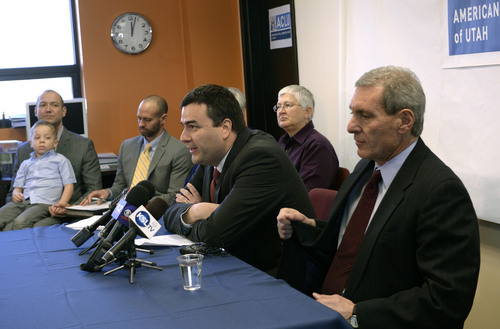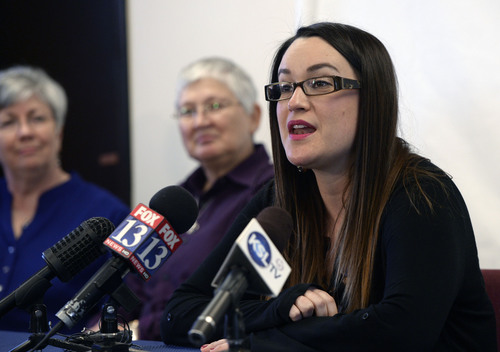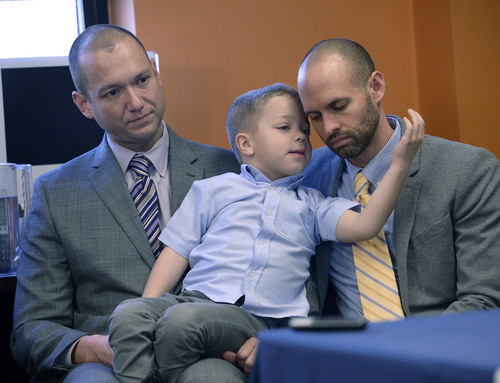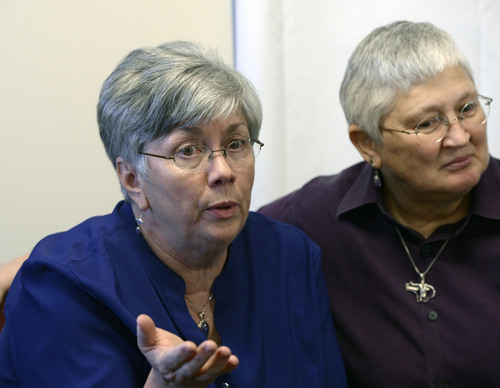This is an archived article that was published on sltrib.com in 2014, and information in the article may be outdated. It is provided only for personal research purposes and may not be reprinted.
A pair of state attorneys told a federal judge on Wednesday that same-sex couples who believe they've been harmed by Utah's decision to freeze their marriages rights created the problem themselves.
Assistant Utah Attorney General Kyle J. Kaiser told U.S. District Court Judge Dale A. Kimball that couples who married after Utah's Amendment 3 was found unconstitutional on Dec. 20 knew the state was seeking to stay the ruling and planned to appeal it.
Assistant Utah Attorney General Joni J. Jones told Kimball that the couples "had no rights under Utah law" until the Dec. 20 decision and once the ruling was stayed, they did not retain vested rights.
Jones said the state is merely not recognizing the marriages while the question of whether same-sex couples have a fundamental right to marriage is resolved, she said.
"There is no question this is an emotional issue, but the state has taken a position of respecting the plaintiffs' rights and respecting the legal process," she said.
Joshua Block, attorney with the national ACLU's Lesbian, Gay, Bisexual and Transgender Project, said the state's move to strip recognition from marriages already performed would be unprecedented.
Whatever the outcome of the state's appeal, that doesn't change the fact that some 1,200 same-sex couples married in Utah before the decision was stayed and have a constitutional right to have those valid marriages recognized, Block said.
"That institution, once created, has special constitutional protections," he said, describing the inviolability of marriages that have taken place a "bedrock constitutional principle."
"You don't undo marriages that have already taken place," he said, and it is the state's attempts to do so that are disrespectful of judicial process.
The ACLU of Utah, the national ACLU's LGBT Project, and the law firm of Strindberg & Scholnick originally filed the lawsuit in state court in January, but it was transferred to federal court at the request of state attorneys. The four couples who are plaintiffs in the case allege the state's decision to put same-sex marriages on hold during its appeal has created a "legal limbo" that is causing irreparable harm and violates their vested rights in the marriages.
The plaintiffs want the court to declare valid any marriages that took place between Dec. 20 and Jan. 6, when the U.S. Supreme Court stayed the decision, even if Amendment 3 is eventually found to be constitutional.
They also want Kimball to ask the Utah Supreme Court to decide if the couples have vested rights to their marriages under the Utah Constitution, and whether those rights could later be withdrawn. The state objects to that, saying the answer is clear under state law that the marriages are not legal.
Both Jones and Kaiser said the situation for same-sex couples in Utah is not comparable to that of same-sex couples in California who married after that state's supreme court upheld gay marriage rights and before voters approved Proposition 8, once again made such unions illegal.
The marriages that occurred between those two events were subsequently declared valid — a correct ruling, Jones said, because they took place before Proposition 8 was enacted. A federal judge later found Proposition 8 unconstitutional, a decision the U.S. Supreme Court last summer declined to address based on a technical issue of whether those who appealing the order had standing.
But Amendment 3, approved by Utah voters in 2004, was in place long before any same-sex marriages happened here and the state reverted to that ban once U.S. District Court Judge Robert J. Shelby's ruling was stayed.
Jones drew a series of questions from Kimball.
"Do no rights occur with marriage?" the judge asked, and then prodded Jones about whether she disputed that the same-sex couples went before proper authorities who performed their marriages, said words and issued legal documents. The marriages, he said, were legal at the time.
"Does that mean nothing?" Kimball asked.
"I don't say it means nothing," Jones said, but it's not "permanent" because if the state eventually wins its appeal the "basis for the marriages will be undermined" since they were based on a faulty ruling.
Jones also argued that the couples have no vested rights under the law since Shelby's ruling is not final and is still on appeal.
Kimball then pressed Jones about how a state victory that once again outlawed same-sex marriage would affect marriages that had already taken place.
Jones said they would be voided.
Salt Lake City attorney Erik Strindberg, who also represents the couples, said the uncertainty, instability and humiliation the plaintiffs are experiencing because of the state's decision will only be exacerbated if they must wait two to three years for the case to be fully litigated.
Those harms include plaintiff Tony Milner's inability to be legally recognized as a co-parent, with Matthew Barraza, of the couple's young son; the possibility that Jonell Evans may be unable to make medical decision for Stacia Ireland in a health emergency; Marina Gomberg and Elenor Heyborne's fears about starting a family given their uncertain status; and the financial burden experienced by Donald Johnson and Carl Fritz Shultz because they can not share a health insurance plan.
Strindberg said that when the Utah attorney general's office entered an opinion advising a state judge to not proceed with Barraza and Milner's adoption, it illustrated the harm to their son who was being told his family was different and not as good as other families.
If the Dec. 20 ruling is affirmed at some point in the future, it won't undo or resolve "the uncertainty and humiliation these couples are going through right now," Strindberg said, all whom acted in concert with existing law.
Under the Constitution, the couples have "clear" liberty interests to marry, establish a home and bring up children, he said, and other court rulings have made clear that even a short deprivation of such rights causes irreparable harm.
"The fact is these people are legally married," Strindberg said. "We can't put that back in the bottle."
After the hearing, plaintiff Jonell Evans said she went into and left the hearing optimistic about the outcome. She and Stacia Ireland, who've been together for 13 years, held a commitment ceremony in 2007 but still wanted to be married.
"When we heard we could get legally married, we went the first day, on Dec. 20, because that commitment is very important to us and we wanted it on the public record," Evans said. "We felt at that time that we were the only ones who could ever dissolve that commitment. We had no idea that the governor could do that just by saying it was so. We've waited long enough and we are ready to have our marriages reinstated."
Outside the courthouse, Strindberg said, "Basically these people either have rights associated with marriage or they don't have any rights. There is no in-between. ... The people who got married, got married because they were in love, the law in place at the time allowed them to get married, why not take advantage of that? ...They had the right to be married under Utah law, so they got married."









